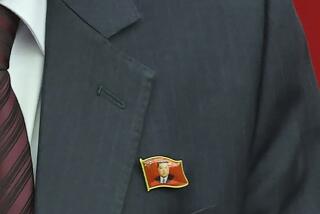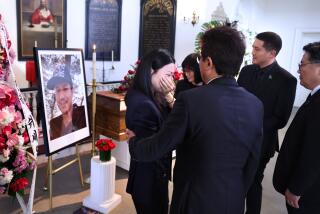For North Koreans in L.A., mixed emotions over Kim’s death
Like many in Los Angeles’ small North Korean community, Kevin Song has long avoided speaking of the “Dear Leader.”
Kim Jong Il’s name evoked too many painful memories and stirred too many intense opinions among those who fled the hermitic nation. A couple of years ago, when mention of the North Korean ruler came up over beers in a Koreatown pub, Song ended up in a barroom brawl with a fellow defector.
On Monday, as the news of Kim’s passing settled in, Song and other North Korean expatriates grappled with complicated emotions. To many, the deceased strongman is not only the embodiment of an oppressive regime but also an inextricable part of the homeland they’re still nostalgic for and sometimes feel compelled to defend.
“He may have been a dictator, but I was sad thinking of Kim Jong Il the man. It is still a human being who died,” said Song, who left North Korea in 1997 and came to the U.S. in 2004. “I do think, politically, it’s a good thing he passed. But my heart wasn’t all that great.”
Song said he was stunned when he saw the news on Korean-language television Sunday night of the sudden death of the figure deified in his native land. It brought back memories of his life there, where he was a supervisor in a state-run mining company. In 1989, he encountered Kim at a conference, he said.
The scuffle with the fellow defector, Song said, occurred after the man said he was ashamed of having been born a North Korean and spoke ill of the dictator. Song said he was upset his homeland and his people were being insulted.
“Kim Jong Il is Kim Jong Il, and just because he maintained a dictatorship, that doesn’t mean North Korean people are idiots. We should live with pride that we were born North Koreans,” he said. “I told him, you were born in that land, and you left not because you had problems with the ideology, but because you were hungry.”
Roberto Hong, an immigration attorney who heads an organization advocating for North Korean refugees’ rights in the U.S., said that although none of the defectors he knows are partial to the late leader, some grow defensive at criticisms of Kim or North Korea. At most gatherings, Hong said, he tries to avoid the topic altogether.
“It’s not a simple picture,” said Hong, who heads the Assn. of North Koreans in America. “A few North Koreans here, they don’t like others going around criticizing North Korea. They think that’s wrong.... It is your own country.”
In conversations he had with defectors in the L.A. area Monday, Hong said, some seemed celebratory while others were reserved and even a little wistful.
For one 32-year-old woman, the news was a glimmer of hope that she might be able to reunite with her two brothers still in North Korea. The woman, who asked not to be named out of fear for her family’s safety, said she learned of the news via text message from a friend in South Korea, also a refugee.
“I told her, ‘Don’t lie to me.’ I thought it was a prank,” said the woman, who is in the U.S. studying English on a student visa.
As she watched a North Korean newscaster who was reporting Kim’s death describe him in glowing terms, she said, she was reminded of the period after she crossed the border into China in 2004. When some of the Chinese she met criticized Kim, she vehemently defended him, believing the indoctrination she had undergone while growing up.
It was a couple of months, she said, until she was able to appreciate the freedom of the outside world and understand the lies she had been told by Kim’s regime.
“Back then, I couldn’t see with my eyes, I couldn’t speak what I wanted,” she said. “When I heard that deceptive language again, I was disgusted.”
Another L.A.-area man, formerly an officer with the North Korean military, said many refugees’ perspectives of Kim were colored by the fact that he lived extravagantly while his people starved.
“We all trusted him at some point a long time ago,” said the man, who works as a security guard in Koreatown and also requested anonymity because of relatives in North Korea.
“In a sense, I think it was inevitable in the flow of history,” he said. “History harshly punished a dictator, as it should.”
More to Read
Sign up for Essential California
The most important California stories and recommendations in your inbox every morning.
You may occasionally receive promotional content from the Los Angeles Times.











